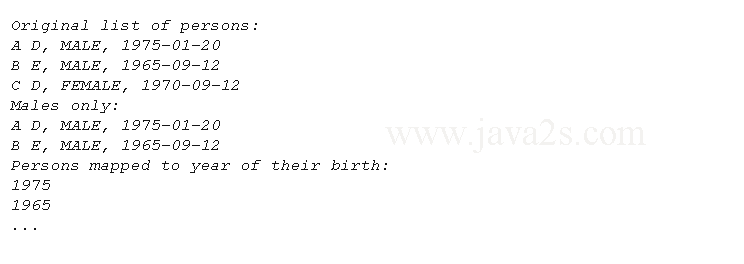Java - Use Functional Interfaces to code logics
Introduction
Gender enum contains two constants to represent the gender of a person.
Person class represents a person; it contains, apart from other methods, a getPersons() method that returns a list of persons.
The program does the following tasks:
- gets a list of persons,
- applies a filter to the list to get a list of only males,
- maps persons to the year of their birth, and adds one year to each male's date of birth.
It performs each of these actions using lambda expressions.
Demo
import java.time.LocalDate; import java.util.ArrayList; import java.util.List; import java.util.function.Consumer; import java.util.function.Function; import java.util.function.Predicate; enum Gender {//ww w . ja va2 s. c o m MALE, FEMALE } class Person { private String firstName; private String lastName; private LocalDate dob; private Gender gender; public Person(String firstName, String lastName, LocalDate dob, Gender gender) { this.firstName = firstName; this.lastName = lastName; this.dob = dob; this.gender = gender; } public String getFirstName() { return firstName; } public void setFirstName(String firstName) { this.firstName = firstName; } public String getLastName() { return lastName; } public void setLastName(String lastName) { this.lastName = lastName; } public LocalDate getDob() { return dob; } public void setDob(LocalDate dob) { this.dob = dob; } public Gender getGender() { return gender; } public void setGender(Gender gender) { this.gender = gender; } @Override public String toString() { return firstName + " " + lastName + ", " + gender + ", " + dob; } // A utility method public static List<Person> getPersons() { ArrayList<Person> list = new ArrayList<>(); list.add(new Person("A", "D", LocalDate.of(1975, 1, 20), Gender.MALE)); list.add(new Person("B", "E", LocalDate.of(1965, 9, 12), Gender.MALE)); list.add(new Person("C", "D", LocalDate.of(1970, 9, 12), Gender.FEMALE)); return list; } } class FunctionUtil { // Applies an action on each item in a list public static <T> void forEach(List<T> list, Consumer<? super T> action) { for (T item : list) { action.accept(item); } } // Applies a filter to a list and returned the filtered list items public static <T> List<T> filter(List<T> list, Predicate<? super T> predicate) { List<T> filteredList = new ArrayList<>(); for (T item : list) { if (predicate.test(item)) { filteredList.add(item); } } return filteredList; } // Maps each item in a list to a value public static <T, R> List<R> map(List<T> list, Function<? super T, R> mapper) { List<R> mappedList = new ArrayList<>(); for (T item : list) { mappedList.add(mapper.apply(item)); } return mappedList; } } public class Main { public static void main(String[] args) { List<Person> list = Person.getPersons(); // Use the forEach() method to print each person in the list System.out.println("Original list of persons:"); FunctionUtil.forEach(list, p -> System.out.println(p)); // Filter only males List<Person> maleList = FunctionUtil.filter(list, p -> p.getGender() == Gender.MALE); System.out.println("\nMales only:"); FunctionUtil.forEach(maleList, p -> System.out.println(p)); // Map each person to his/her year of birth List<Integer> dobYearList = FunctionUtil.map(list, p -> p.getDob().getYear()); System.out.println("\nPersons mapped to year of their birth:"); FunctionUtil.forEach(dobYearList, year -> System.out.println(year)); // Apply an action to each person in the list // Add one year to each male's dob FunctionUtil.forEach(maleList, p -> p.setDob(p.getDob().plusYears(1))); System.out.println("\nMales only after ading 1 year to DOB:"); FunctionUtil.forEach(maleList, p -> System.out.println(p)); } }
Result

Related Topic
- Function<T,R> Interface
- Function interface default and static methods
- Function interface chained together